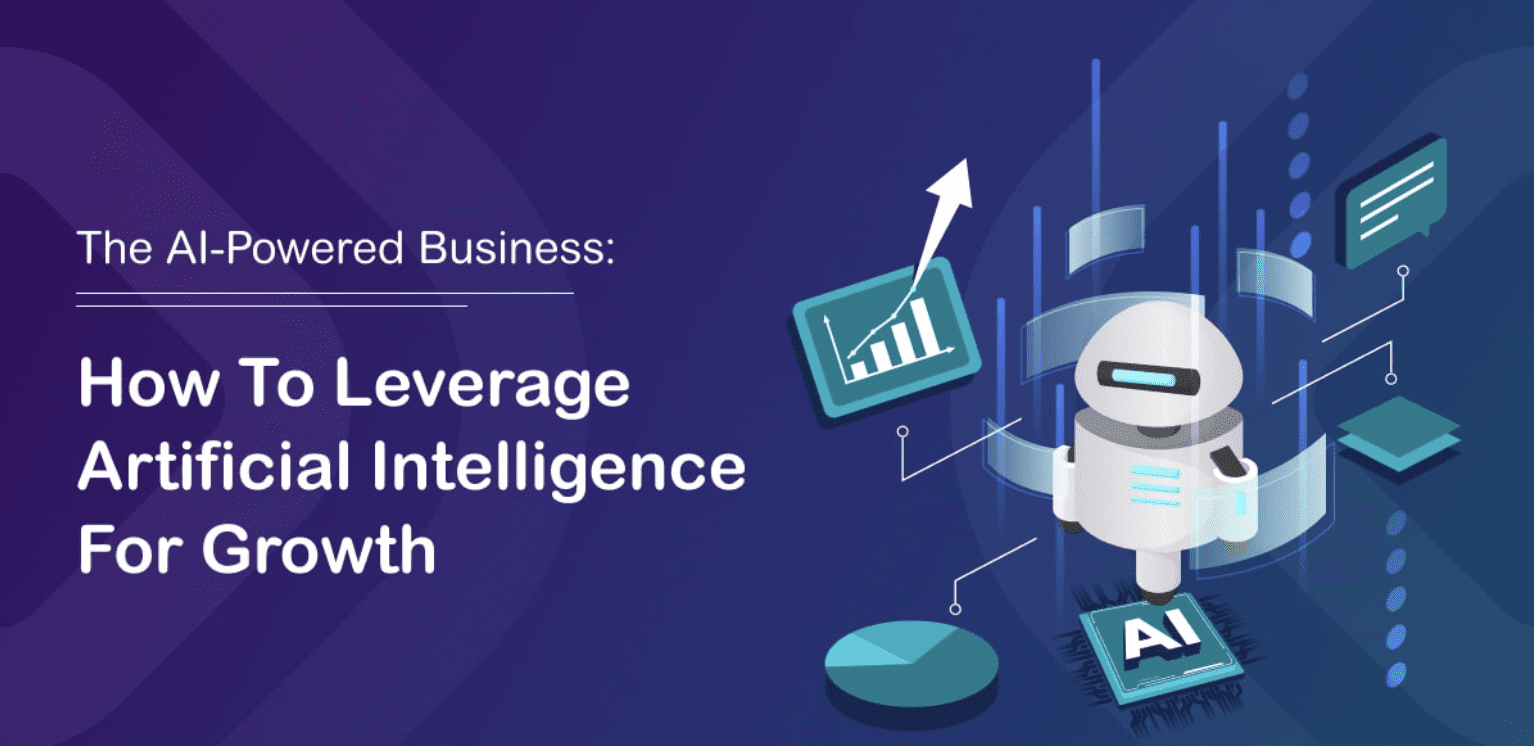
The pace of AI in the business sector is accelerating and is impacting both small and large businesses operating in different industries. AI technologies create new competitive possibilities for everyone ranging from small startups to major corporations by streamlining, enhancing, and assisting decision-making. The rise of AI-powered business solutions is enabling companies to gain a strategic advantage through advanced analytics, intelligent automation, and data-driven decision-making.
AI can automate repetitive tasks, provide enhanced access to market information, and even personalize clients’ interactions online. This blog is all about the vast applications of AI to all kinds of businesses not just surviving in a competitive market but thriving by completely transforming their business models and ways of relating to customers for better results.
Enhancing Customer Experience
Businesses are increasingly relying on the potential of AI to enhance customer experiences with time.
AI can handle customer data at a tremendous pace that was unimaginable in the past, and it is the only tool that ensures quality of service.
- Individualized Recommendations: AI algorithms can suggest what customers like and dislike, predicting their behavior by studying the data from past interactions, purchases, and browsing. It provides the opportunity for businesses to improve the shopping experience.
- Dynamic Content Customization: AI can help web and app owners customize the information presented to their audience, so it seems relevant to every visitor’s personal interests and current needs.
- Personalized Communication: AI enables customized messages to be addressed in marketing communications. For example, in emails and push notifications, that correspond exactly to the user’s profile, which leads to enhanced engagement and loyalty.
Implementation of AI-powered Chatbots
Chatbots, enhanced by AI, are playing a crucial role in providing efficient and cost-effective customer support:
- 24/7 Availability: With the implementation of AI-powered chatbots, customers can be assisted nonstop, and instant answers can be given to their inquiries, which is the key success factor to achieving high customer satisfaction.
- Handling Multiple Requests Simultaneously: Unlike humans, AI chatbots can take care of a bunch of interactions simultaneously, without the deterioration of the quality of service.
- Instant Problem Resolution: For routine problems, chatbots could offer the most immediate answers, via automated responses, obviating the necessity of human intervention, and making the resolution process faster, therefore.
- Learning and Adaptation: AI chatbots can be taught from another interaction, every time getting better their answers and the level of effectiveness.
Optimizing Business Operations
Businesses must operate based on the most efficient ways and to reduce these costs, AI is critical in the transformation process. AI technologies are doing away with mundane and repetitive tasks to prepare organizations for better efficiency through human resource assignments to more strategic jobs. There is a two-fold impact of this change; it not only improves productivity but also makes the operations more precise and faster.
Smoothing Out Business Functions Using Automation
AI-instruction automation can help bring a lot of efficiency to workplace processes. For example, AI algorithms can be coded to deal with activities such as data entry, scheduling, and even decision processes that are not simple. Consequently, the workflow becomes more effective, since works are done faster and with fewer problems. Automation will also be in tune with all routine and mandatory operations, ensuring that all actions follow set rules and laws.
Examples of AI Applications in Operational Efficiency
- Inventory Management: AI systems can precisely predict inventory needs by analyzing past sales data, trends, seasonal factors, or other market-related issues. This enables the business to keep optimum stock levels ensuring that there are no excess stock situations and that their stock levels are not understocked thus reducing warehousing costs and maximizing sales opportunities.
- Logistics: In a logistics scenario, AI improves not only on route planning but also on freight management. Analyzing traffic patterns, weather conditions, and delivery schedules, AI can find the most logical routes that would save delivery time and fuel. AI robots that are driven by artificial intelligence are deployed more often in warehouses for picking and packaging orders, which significantly increases the speed of the logistics chain and the chances for human error.
Data-Driven Decision Making
The applications of AI tools, especially machine learning algorithms in this field, are the analysis of big data to locate patterns, trends, and rare cases. Consumer purchasing behaviors can also be predicted and stock levels can be better managed by utilizing real-time sales data. This process starts with collecting data, ensuring its accuracy, and then using AI models that can extract insights that eventually lead to highly efficient business processes which ultimately mean satisfied customers.
AI and Its Impact on Forecasting and Strategic Planning
AI considerably reinforces foresight and strategic planning via forecasting future trends by using present data. This anticipating ability allows businesses to see ahead of the market and take action promptly, respectively. So, the firms can stay ahead of the competition. AI may successfully predict the demand peaks thereby assisting the enterprise with effective resource allocation and strategic adjustment shortly.
Content Creation and Marketing
AI has redefined the way of content generation and can now be used to automatically generate written, visual, and multimedia content. It not only speeds up the manufacturing process but also makes it possible to ensure uniformity and relevancy across the platforms.
Personal Marketing and Specific Advertising Strategies
AI has the unique advantage of being able to customize marketing operations by processing customer data to produce tailored advertising campaigns. It will be able to foresee customer behavior, tastes, and possible purchasing patterns and obtain it through the processing of huge data sets. This feature, in turn, enables businesses to design very bespoke marketing messages that are possible to convert, which leads to a higher overall return on investment (ROI) in marketing.
Cybersecurity and Risk Management
- Automating Security Protocols: Data mining to forecast possible dangers and improve the defensive measures beforehand.
- Effective Data Encryption: The capability to encrypt and protect data from illegal access is all part of it.
- Adaptive Security Systems: Envisioning and upholding prosperity even amid obstacles and everlasting vigilance against new problems.
AI Tools in the Monitoring, Identification, and Response to Security Incidents
- Continuous Monitoring: AI systems are applied to data processing to find just patterns that might mean a breach during security processes.
- Automated Responses: When AI perceives the presence of danger, it could start undertaking tasks like systemic isolation or security deployment without human supervision.
- Learning from Incidents: AI algorithms are empowered by historical data to aid in their prediction performance, resulting in better preparedness to deal with later threats.
Innovation and Product Development
AI can be applied in the R&D of new products and services to speed up complicated experiments, automate routine tasks, and bring innovative solutions sooner. AI algorithms can, for example, forecast outcomes, fine-tune processes, or indicate the best ways of developing new approaches using data analysis. This is not only a reduction in time and cost that conventional R&D usually uses but also an expansion of possibilities that were previously undetectable without the insight provided by AI.
AI-driven Innovations
- Automotive Industry: AI has changed the automotive industry through the creation of the advanced AIVs. One of the applications of AI at Tesla is data collection which the company uses with drivers on the road for improving and updating autopilot capabilities through over-the-air software updates. This real-time data capturing and AI for swift improvements builds up Tesla an advantage in automotive technology.
- Pharmaceuticals: The pharmaceutical industry today relies heavily on artificial intelligence (AI). So, for instance, Pfizer would utilize AI to model the behavior of drug compounds, which significantly expedites the drug discovery process. AI tools work in such a way that prospects of a drug compound are predicted, cutting years to months and significantly enhancing a company’s response prowess to global pandemics like COVID-19.
- Retail: Amazon employs AI to create real-time algorithms that assist in the formulation of individualized recommendations based on the customer’s past shopping histories. Not only that the accuracy of the recommendation also increases user satisfaction. Moreover, it also results in increased sales of products that are suitable for the user.
Instant Analysis and Actual Market Facts
Intelligent tools possess the ability to examine huge amounts of data very quickly. Furthermore, this technology gives companies not only the power to see market trends as they unfold but also the ability to better foresee future movements. One of the key benefits of AI in business is the fact that it is capable of processing data at lightning speed, disclosing the hidden value, which was undetectable due to the overwhelming quantity of data available.
Conclusion
Companies that adopt AI will not only transform their internal workings but also define what service, engagement, and market responsiveness mean, in the long term. There is a shift of this nature not only about the adoption of new technologies but also the culture that incorporates innovation, predicts trends, and thus takes the forward side. As AI is being developed, it is expected that businesses will no longer think only of improvements, but also of a completely new way of tackling the vagueness of the future market terrain.








